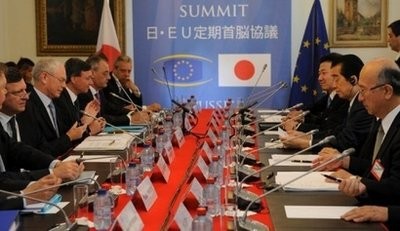Leaders of the European Union and Japan on Saturday agreed to start talks towards a multi-billion-euro free trade deal linking the world's third biggest economy to the globe's largest market.
Long demanded by Tokyo, the decision to launch preliminary talks on a trade deal and explore a new binding political accord, was announced at a summit between EU leaders and Japanese Prime Minister Naoto Kan.
"We still have a long way to go, but the objective is now clear," said EU president Herman Van Rompuy after talks in a history-packed castle nestling in parkland on the outskirts of Brussels.
"When two of the world's largest trading partners jointly confirm their intention to work towards a free trade agreement, that is a big step forward," he added.

A joint statement said it was "agreed to start the process for negotiations for a deep and comprehensive free trade agreement (FTA)" in parallel with "a binding agreement covering political, global and other sectoral cooperation."
The negotiations could start as early as next year depending on the success of a prior "scoping exercise", a to-do list of goals to ensure both sides share the same concerns and ambitions. Work on that is to begin immediately.
Following Japan's triple March disaster, Europe also moved to meet Japanese calls for an easing of restrictions on food imports while pledging to work hand in hand to promote tighter international standards for nuclear safety.
"Japan is safe and open for business," said European Commission president Jose Manuel Barroso.
The economic fallout from the quake, tsunami and nuclear meltdown has accelerated Japan's drive to win a better trade deal with the 27-nation bloc of half a billion people, which last year struck its first ever FTA in Asia with Tokyo's rival, South Korea.
Hailing Saturday's accord after decades of trade friction, Kan said: "I'm convinced this will lead to a far-reaching economic partnership agreement."
But the EU says a mountain of work needs to be done to overcome European businesses' complaints of continuing obstacles in accessing the Japanese market.
Europe notably complains over unfair treatment in government procurement, comparing a 2.5 percent of EU gross domestic product open to Japanese companies in 2007, to a 0.5 percent of Japan's GDP offered to EU firms.
And EU officials say that while foreign investment across the bloc amounts to 30 percent of its GDP, in Japan foreign investment is at a mere three percent.
Japan meanwhile would like tariffs lifted on its cars and flat-screen TVs.
With bilateral trade already at 110 billion euros (about $160 billion) a year, tackling all obstacles to free trade would release a "big potential" for business on both sides, said Barroso.
Prompted by Britain, Europe's leaders in March called for FTA talks to aid Japan -- but on the proviso that Tokyo lift restrictions to trade.
Japan, struggling to recover from its March disasters, had hoped the summit would offer a formal launch of FTA talks, but Europe held back until winning more assurances of a level playing field.
"We want to do business with Japan but there must be a clear give-and-take," said a business sector lobbyist. "We want to see clear signs from Japan that it is open to us."
Even the European Parliament stepped up on the eve of the summit to warn against jumping into bed with Japan.
"Instead of rushing headlong into new negotiations over a free trade agreement, EU countries should insist on tangible results," said Euro-MP Daniel Caspary, who sits on the assembly's trade committee.
But Van Rompuy, a known aficionado of Japanese-style haiku mini-poems, had words of hope for Japan.
Voicing his conviction it would emerge strong from the March disasters, he read out his latest haiku for Kan.
"The three disasters
Storms turn into a soft wind
A new, humane wind".
Said Kan: "This is a piece of haiku that really touches your heart."
























